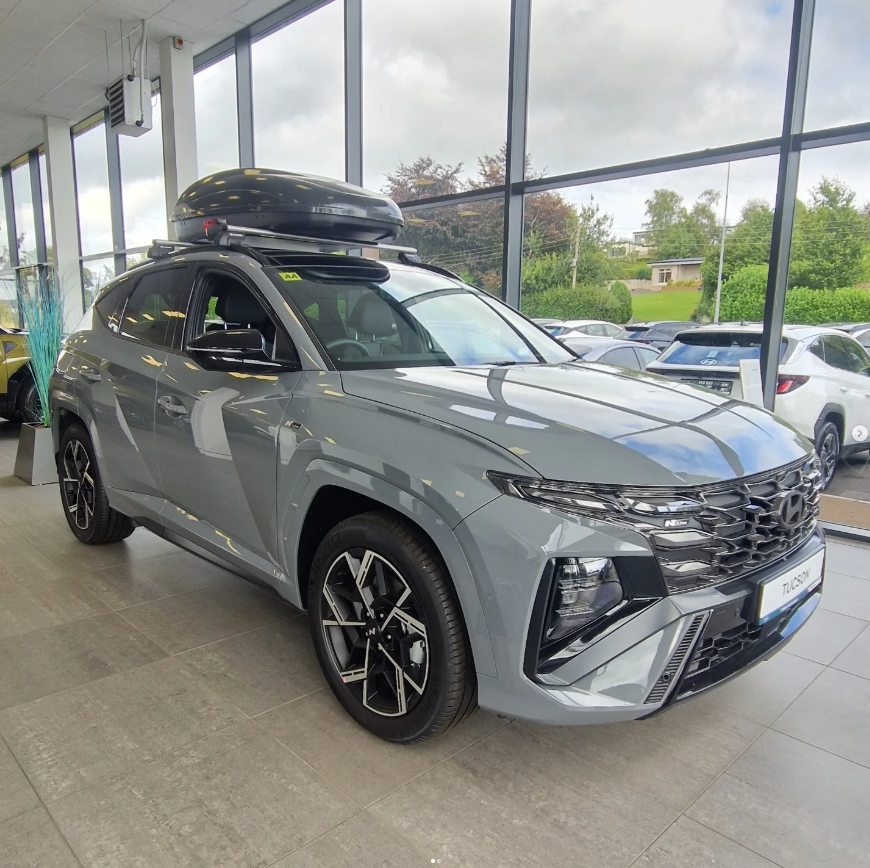Plug-in Hybrid vs Electric: What’s the Difference?
People searching for terms like “EV charging stations,” “electric vehicle charging station,” “ev chargers near me,” “electric car charger for home,” or “home charging station” are usually looking for practical information about charging options, where to find chargers, how to install one at home, and what the costs and benefits are.
That’s why it’s helpful to understand the different types of electrified vehicles, from plug-in hybrids (PHEVs) to fully electric cars (EVs) and how each one fits into Ireland’s growing EV charging network.
What is a Plug-in Hybrid (PHEV)?
A plug-in hybrid combines a traditional internal combustion engine (petrol or diesel) with an electric motor and a battery that can be plugged in and charged. Drivers typically enjoy a modest all-electric range (around 30–80 km) before the petrol engine takes over.

Hyundai Tucson Plug-In-Hybrid, O'Brien's Hyundai, Mullingar, Co.Westmeath
- You can use your home charging station or public EV charging stations / electric vehicle charging stations / ev station to power the electric motor.
- Once the battery depletes, the car runs like a normal hybrid.
- It offers flexibility for those who often travel beyond the electric-only range.
What is a Full Electric Vehicle (EV)?
An electric car is powered solely by electricity — there’s no petrol engine at all.
- You rely entirely on electric car charger / electric charger near me / home car charging station / home EV charging station or public chargers to recharge.
- EVs produce zero tailpipe emissions, have lower running costs, and feature simpler mechanics compared with traditional cars.
What About Regular Hybrids?
Standard hybrids (non-plug-in) cannot be plugged in.
They recharge their batteries using the engine and regenerative braking — meaning you charge as you drive. Simple as that.
Why Electric Vehicles Are Becoming More Popular in Ireland
- Public charging infrastructure is expanding quickly across Ireland, with new fast chargers and hubs appearing on motorways and in towns nationwide.
- Hyundai Ireland offers a convenient Charge myHyundai system, giving drivers access to over 1,000 charging points nationwide.
- Many automakers promote free home chargers or special charging offers. For instance, Hyundai’s national campaigns have included a free Energia home charger with select new electric models.
- The SEAI home charger grant offers up to €300 towards the purchase and installation of a home charger.
- The Irish Government has announced plans to install 90 new recharging hubs across the national road network in the coming years.
Because charging at home is cheaper — especially on off-peak electricity — many EV owners estimate their weekly driving costs at under €5.
Home Charging Stations: What You Need to Know
- A typical home EV charger / electric car charger for home (AC, up to 7.4 kW) costs around €1,200–€1,600 including installation.
- The SEAI home charger grant can reduce that cost by up to €300.
- Only a Safe Electric registered electrician is permitted to install a home charger in Ireland.
- Most homeowners mount their home car charging station on a garage or driveway wall for easy overnight use.
- You can check public charging options through apps such as Charge myHyundai, Weev, or ESB eCars maps.
- Some EVs offer V2L (Vehicle-to-Load) capability — meaning you can plug appliances such as a fridge, kettle, hairdryer, or lights directly into your car using an adapter, turning your EV into a portable power source.
Why Electric Can Be the Cheapest Option
- Electricity (especially off-peak) costs significantly less per kilometre than petrol or diesel.
- EVs avoid many traditional costs — no fuel tax, fewer maintenance items, and reduced servicing expenses.
- Charging overnight at home makes the most of low-rate electricity tariffs, cutting running costs dramatically.
Special Offers from Hyundai & Home Charger Bundles
Hyundai frequently runs offers that include a free home charger with new EV purchases — such as the Ioniq 5, Ioniq 6, or Tucson Plug-in Hybrid, which remains one of Ireland’s best-selling SUVs. These bundles make switching to electric or hybrid driving even more accessible.
In Summary
- Plug-in hybrid vehicles (PHEVs) combine electric power with petrol flexibility.
- Full electric vehicles (EVs) rely solely on electricity for smooth, zero-emission driving.
- Home charging stations are key to EV ownership — with grants, safe installation, and chargers delivering up to 7.4 kW AC power.
- Ireland’s EV infrastructure is expanding fast, with national and private investment improving access to EV charging stations.
- Off-peak charging means you can drive for as little as a few euros per week.
- V2L adapters add convenience, powering small household items directly from your car.
- Special finance and home charger offers make now the ideal time to explore electric and plug-in hybrid driving.
